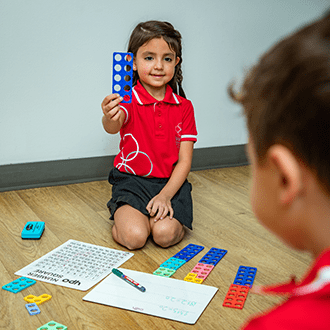We use cookies to improve your online experiences. To learn more and choose your cookies options, please refer to our cookie policy.

I am always amazed by our bilingual students at SISD. Our corridors are buzzing with students speaking their native languages, and it is normal to see groups of teachers and students speaking in a common tongue. The same can be seen at parent events; everyone at SISD is keen to improve their language skills whether they are a beginner or a native speaker. We all agree that the best way to master a language is to speak it regularly, so why should mathematics be any different? Numerical literacy is the ability to use basic mathematics skills in everyday life. Logic is a key component of numerical literacy, but it is not only relevant to mathematics; logic is a transferable skill that can be applied to all walks of life. I believe that regular exposure to numeracy and logic problems will develop numerical fluency and help breakdown some of the negative connotations associated with mathematics.
The summer break is a great time to expose children to mathematics in the real world, here are some everyday scenarios that can be used to encourage numerical literacy: Calculating a tip at a restaurant: Encourage your child to calculate the tip using percentages and some estimation. At the gas station: Gas prices have risen by 50%, how much more will it cost to fill up the family car? Recipes: This recipe feeds two people but there are four in our family. How much more of each ingredient should we use? Travelling: Children always ask, “Are we there yet?”, why not challenge them to calculate the time left in the journey using some basic estimation!
Wordle is a word-based puzzle that has taken the world by storm; millions of people worldwide play the game every day, improving their vocabulary, spelling and even logic! Similarly, reading for pleasure is a huge part of a students’ life at SISD, but why stop here? Sudoku, KenKen, and Kakuro are three popular games that can help develop numerical literacy, but above all else they are fun! Number based games can help children improve their mental arithmetic and develop their problem-solving skills. Long flights or car journeys are a great opportunity to spend a few hours on these puzzles; I suggest a paper copy of the games to help reduce the time spent in front of a screen!
“Pure mathematics is in its own way the poetry of logical ideas” – Albert EinsteinNone of the above suggestions will guarantee that a child will grow up to be a mathematical genius, however they can help pave the way to a positive relationship with the subject. Life itself is full of puzzles and challenges, think of the above as ways to develop a child holistically, a passion for mathematics can be as easy as the bilingualism we are immersed in every day!